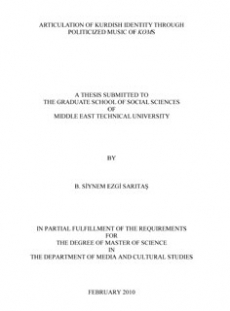| INTRODUCTION
The significance of music in political life is a well-known phenomenon that has been recorded by many, over the centuries from the time of Plato. In Republic, Plato echoes Socrates' saying: "The introduction of novel fashions in music is a thing to beware of as endangering the whole fabric of society, whose most important conventions are unsettled by any revolution in that quarter.” (Plato, 1945: 115 cited in Pratt, 1990: 2-3) While Plato is talking about the effects of changes in the musical field on the political realm, this thesis will concentrate more on the effects of political realm on music. However, as it will tried to be demonstrated throughout the thesis, the relationship between the two is not unidirectional and simplistic, rather there is a complex set of interrelations. There are numerous ways music and politics are intertwined from rap and rock to folk music. While some of these ways are much more implicit and complex to analyze, in other cases, music is used as a political tool in an overt way. It has been used to articulate the hegemonic discourses of the state as well as by oppositional movements. In both cases, it functions to mobilize people,
popularize different discourses and has been a part of the identity construction processes.
Music is both a sign and a way of creating a community. It is representative and constructive. In this study, I will analyze the role of politicized music in the construction of Kurdish identity. While the focus will be on the 1990s, when a number of politicized Kurdish music groups - as they will be referred in this thesis; koms – emerged, the changes that took place during 2000s are also be scrutinized. Political music in the context of Kurdish nationalist movement should be discussed within the framework of construction of national identity through music and nationalization of music and as an oppositional music, with its function of communicating the cause of the movement, mobilization and construction of the collective identity of the movement. The separation between the two is only an analytical one as these processes are not independent from each other. The Kurdish movement has approached music with a nationalist agenda, but as it has not established itself into a state, its tools are not as comprehensive and domineering as that of a state's. Moreover, as the apparatuses of a nation state such as schools, national history and language institutions, official maps have not been available to the Kurdish movement, music has adopted some of the functions of these institutions.
Turkish music reform and the oppositional music tradition in Turkey will be examined because of their role in the emergence of koms. Before doing this, I will have a brief look at theories of nationalism; how the nations as well as national music are invented. “Music has been a tool intensively used by the new states or by the classes that have the highest stake in the new social formations of dominant classifications through the control of archives, educational institutions including the conservators and media systems.” (Stokes, 1994: 10) The process of defining the "national styles" has never been unproblematic: Who makes the definition, what kinds of instruments are involved in this process and how the existing music world is affected by these processes are important questions to ask... | 